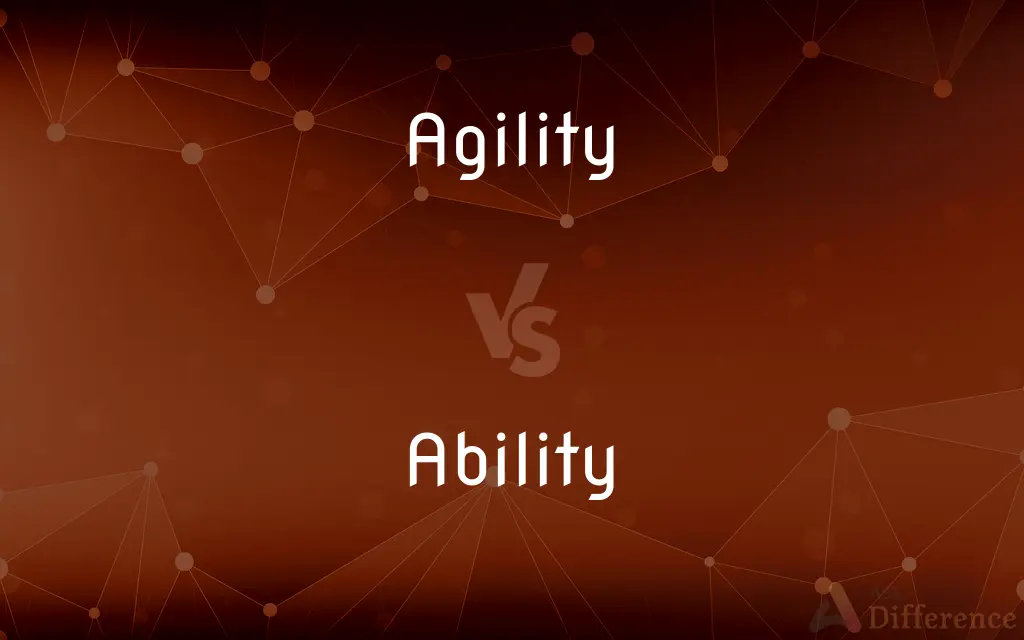Agility vs. Ability — What's the Difference?
By Tayyaba Rehman & Fiza Rafique — Updated on March 28, 2024
Agility refers to the ability to move quickly and easily, often implying physical coordination, while ability encompasses the capacity to perform tasks, whether physical, cognitive, or skill-based.

Difference Between Agility and Ability
Table of Contents
ADVERTISEMENT
Key Differences
Agility is a specific type of physical ability that emphasizes speed, flexibility, and the skillful control of movement, important in sports and physical activities. Ability, on the other hand, refers more broadly to the competence in performing any task, whether it involves physical action, intellectual problem-solving, or specific talents.
In the context of athletics, agility is crucial for maneuvers that require rapid changes in direction or pace, underscoring an athlete's control over their movements. Ability, however, can refer to a wider range of competencies, including an athlete's strength, endurance, or strategic thinking, not just their physical quickness.
Agility is often developed through targeted training that enhances reflexes, balance, and coordination, reflecting a focused aspect of physical fitness. Conversely, abilities can be innate or developed through general education, practice, and experience, encompassing everything from language fluency to musical talent or mathematical reasoning.
While agility is typically discussed in relation to physical performance, the concept of mental agility exists, referring to the ability to think and draw conclusions quickly. This contrasts with broader cognitive abilities, which include memory, comprehension, and the capacity for learning and adaptation.
The measurement of agility often involves specific tests or drills that assess speed and coordination in changing direction. Abilities, however, are evaluated through a wide array of methods depending on the specific skill or competence, from standardized tests to performance evaluations.
ADVERTISEMENT
Comparison Chart
Definition
The capability to move quickly and easily.
The capacity to perform a task or action.
Key Components
Speed, flexibility, coordination.
Competence in physical, cognitive, or skill-based tasks.
Context
Primarily physical activities and sports.
Broad range of tasks, including intellectual and skill-based activities.
Development
Through targeted physical training.
Through education, practice, and experience.
Measurement
Specific agility tests and drills.
Varied methods including standardized tests and performance evaluations.
Compare with Definitions
Agility
The ability to move quickly and change direction with ease.
The player's agility allows her to outmaneuver opponents on the field.
Ability
Physical, mental, or legal power to perform.
The athlete's physical ability is unparalleled.
Agility
Physical or mental quickness and nimbleness.
Mental agility is crucial for solving complex puzzles.
Ability
The possession of the means or skill to do something.
His ability to learn languages is remarkable.
Agility
Skill in handling tasks or situations with ease and speed.
His agility in negotiations won the deal.
Ability
A skill or talent that can be developed.
She has the ability to become a great writer.
Agility
The quality of being adaptable and flexible.
The company's agility in responding to market changes contributed to its success.
Ability
Talent, skill, or proficiency in a particular area.
Her musical ability was evident even as a child.
Agility
The ability to think and understand quickly.
Her mental agility impressed her teachers.
Ability
The capacity to do something well; expertise.
He demonstrated his ability in mathematics.
Agility
Agility or nimbleness is an ability to change the body's position efficiently, and requires the integration of isolated movement skills using a combination of balance, coordination, speed, reflexes, strength and endurance. Agility is the ability to change the direction of the body in an efficient and effective manner and to achieve this requires a combination of Balance – The ability to maintain equilibrium when stationary or moving (i.e.
Ability
Possession of the means or skill to do something
The manager had lost his ability to motivate the players
Agility
The state or quality of being agile; nimbleness.
Ability
Talent, skill, or proficiency in a particular area
Pupils of all abilities
A man of exceptional ability
Agility
(uncountable) The quality of being agile; the power of moving the limbs quickly and easily; quickness of motion
His superior agility countered his lack of strength.
Ability
The quality of being able to do something, especially the physical, mental, financial, or legal power to accomplish something.
Agility
(countable) A faculty of being agile in body, mind, or figuratively.
Ability
A skill, talent, or capacity
A student of many abilities.
Agility
The quality of being agile; the power of moving the limbs quickly and easily; nimbleness; activity; quickness of motion; as, strength and agility of body.
They . . . trust to the agility of their wit.
Wheeling with the agility of a hawk.
Ability
The quality of being suitable for or receptive to a specified treatment
The ability of a computer to be configured for use as a file server. See Usage Note at able.
Agility
Activity; powerful agency.
The agility of the sun's fiery heat.
Ability
(obsolete) Suitableness.
Agility
The gracefulness of a person or animal that is quick and nimble
Ability
(uncountable) The quality or state of being able; capacity to do or of doing something; having the necessary power.
This phone has the ability to have its software upgraded wirelessly.
This wood has the ability to fight off insects, fungus, and mold for a considerable time.
Ability
The legal wherewithal to act.
Ability
Physical power.
Ability
(archaic) Financial ability.
Ability
(uncountable) A unique power of the mind; a faculty.
Ability
(countable) A skill or competence in doing; mental power; talent; aptitude.
They are persons of ability, who will go far in life.
She has an uncanny ability to defuse conflict.
A mixed-ability class
Ability
The quality or state of being able; power to perform, whether physical, moral, intellectual, conventional, or legal; capacity; skill or competence in doing; sufficiency of strength, skill, resources, etc.; - in the plural, faculty, talent.
Then the disciples, every man according to his ability, determined to send relief unto the brethren.
Natural abilities are like natural plants, that need pruning by study.
The public men of England, with much of a peculiar kind of ability.
Ability
The quality of being able to perform; a quality that permits or facilitates achievement or accomplishment
Ability
Possession of the qualities (especially mental qualities) required to do something or get something done;
Danger heightened his powers of discrimination
Common Curiosities
How can agility be improved?
Agility can be improved through targeted exercises that enhance speed, coordination, and flexibility, such as agility ladder drills or plyometrics.
What is the difference between agility and ability?
Agility specifically refers to quickness and ease of movement, while ability is a broader term for the capacity to perform any task.
Can agility be considered a type of ability?
Yes, agility can be considered a specific type of physical or mental ability focusing on quickness and flexibility.
Does agility only apply to physical tasks?
No, while agility is often associated with physical tasks, the concept of mental agility—quick thinking and adaptability—is also important.
Can someone have high ability but low agility?
Yes, it's possible to have high ability in a certain area, such as intellectual tasks, while having lower agility, especially in a physical context.
How does agility affect performance in the workplace?
In the workplace, agility, particularly mental agility, can enhance problem-solving, adaptability, and the ability to handle fast-paced or changing environments.
How are abilities assessed?
Abilities are assessed through various methods depending on the specific skill, including tests, performance evaluations, and observations.
Are all athletes agile?
Most athletes have a degree of agility, but the level can vary significantly depending on the sport and the athlete's specific role within it.
Is agility more important than other abilities?
The importance of agility relative to other abilities depends on the context; in sports, it may be crucial, while in academic settings, other cognitive abilities might be more valued.
Can technological tools enhance agility or ability?
Technological tools can enhance both by providing training programs, simulations, and tools designed to improve specific skills or physical attributes.
Is ability innate or acquired?
Ability can be both innate and acquired; people may be born with certain talents or capacities, but abilities can also be developed through practice and learning.
What role does nutrition play in maintaining agility and ability?
Proper nutrition supports overall health, which in turn can maintain or enhance both physical agility and cognitive abilities.
How does age impact agility and ability?
While some abilities, like knowledge, can increase with age, physical agility typically declines, though this can be mitigated with regular exercise.
How do training programs differ for agility and ability enhancement?
Training for agility focuses on exercises that improve quickness and coordination, while training for other abilities might involve more diverse methods including study, practice, and theoretical learning.
Can abilities be lost over time?
Yes, abilities, including agility, can diminish without practice or as a result of aging or health issues.
Share Your Discovery

Previous Comparison
Promotion vs. Offer
Next Comparison
Loganberry vs. RaspberryAuthor Spotlight
Written by
Tayyaba RehmanTayyaba Rehman is a distinguished writer, currently serving as a primary contributor to askdifference.com. As a researcher in semantics and etymology, Tayyaba's passion for the complexity of languages and their distinctions has found a perfect home on the platform. Tayyaba delves into the intricacies of language, distinguishing between commonly confused words and phrases, thereby providing clarity for readers worldwide.
Co-written by
Fiza RafiqueFiza Rafique is a skilled content writer at AskDifference.com, where she meticulously refines and enhances written pieces. Drawing from her vast editorial expertise, Fiza ensures clarity, accuracy, and precision in every article. Passionate about language, she continually seeks to elevate the quality of content for readers worldwide.














































